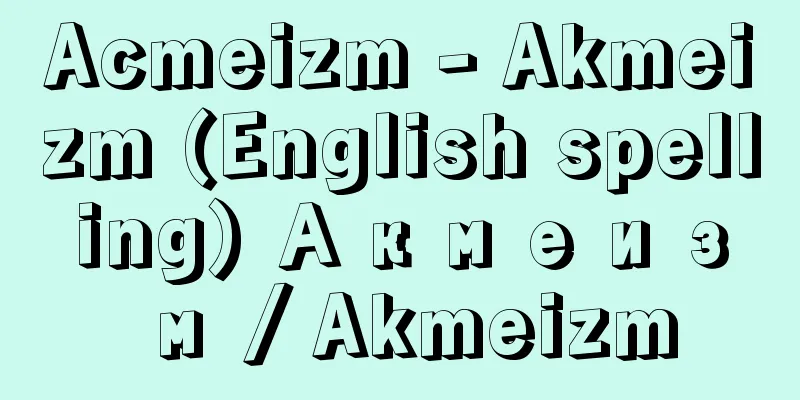Acmeizm - Akmeizm (English spelling) Акмеизм / Akmeizm

|
A literary school that was established in the early 1910s, shortly after the Russian Symbolist movement had essentially disintegrated. It was active in the magazine Apollon. It regarded the Russian Symbolists as its "revered fathers" and inherited much of their legacy in terms of poetic techniques, but rejected the mystical world of theosophy and occultism, and sought to restore classical clarity and a sense of real life. It was founded by Gumilyov and Gorodetsky, and was joined by Kuzmin, Mandelstam, Akhmatova, and others. As the name, derived from the Greek word "acme" (the height), suggests, Acmeist poets considered their works to be the highest expression of artistic truth, but also called themselves Adamists, named after Adam, the ancestor of mankind, because they sought to adhere to a masculine and straightforward worldview. They generally avoided abstract and conceptual vocabulary, preferring hard and clear expressions, and painted themes such as exotic nature, prehistoric life, and love. Their views on things and words themselves partially shared those of the Futurist poets of the following generation. Although the movement disappeared after the revolution, its spirit was inherited by outstanding poets such as Tsvetaeva and Khodasevich. [Ikuo Kameyama] Source: Shogakukan Encyclopedia Nipponica About Encyclopedia Nipponica Information | Legend |
|
ロシア象徴派の運動が事実上解体してまもない1910年代初めに成立した文学流派。雑誌『アポロン』に拠(よ)って活動した。ロシア象徴派を「敬うべき父」とみなし、詩的技法の点でその遺産を数多く受け継いだが、神智(しんち)論、オカルティズムなどの神秘主義的な世界を否定して、古典的な明晰(めいせき)さ、現実の生命感の回復を志した。グミリョフ、ゴロデツキーを創始者として、クズミン、マンデリシュターム、アフマートワらがこれに加わった。 ギリシア語の「頂点(アクメ)」に由来するその名が示すとおり、アクメイズムの詩人たちは、自らの作品を芸術的真実の最高の表現と考え、また一方で、男性的かつ直截(ちょくせつ)な世界観を貫こうとする立場から、人類の祖アダムに由来するアダミズムをも名のった。彼らは概して、抽象的・観念的な語彙(ごい)を避け、硬質で明解な表現を好み、エキゾチックな自然、前史時代の生活、恋愛などをテーマに描いた。事物やことばそのものに対する考え方には、次代の未来派詩人たちと部分的に共通するものがある。革命後、運動としては消滅したが、その精神はツベターエワ、ホダセービチらの優れた詩人によって受け継がれた。 [亀山郁夫] 出典 小学館 日本大百科全書(ニッポニカ)日本大百科全書(ニッポニカ)について 情報 | 凡例 |
<<: Accra - Akura (English spelling) Accra
>>: Demonology - akumagaku (English spelling) demonology
Recommend
Kaleidoscope - Mangekyou
A toy (gangu) made by applying the principle of t...
Carbohydrates - glucide
A general term for substances whose main componen...
Special
…Eudoxus, who was already an independent research...
Marquis of Queensberry
… The repeated bans caused a sense of crisis for ...
alaybeyi
…The sipahis who went to war were under the comma...
Keiseiko - Keiseiko
A local nobleman from the Song Dynasty in China. ...
Kamaishi Port
…The main means of transportation to inland areas...
Carbonaceous chondrite
A general term for a group of unique stony meteori...
Blue-striped lizard - Blue-striped lizard
... Of the lizards found in Japan, the Kishinouye...
Erichsen test
A material test carried out to check the formabil...
Phloroglucin
It is a compound equivalent to 1,3,5-trihydroxyben...
Dang Xuan Khu (English spelling)
…He has been the Chairman of the Council of State...
Hattusili III
? - c.1250 BC The 10th king of the New Hittite Kin...
Sake - Seishu
A typical brewed alcoholic drink from ancient Jap...
Lord of the fort - Ushiyu
…As for the latter, after the time of Wang Mang, ...









